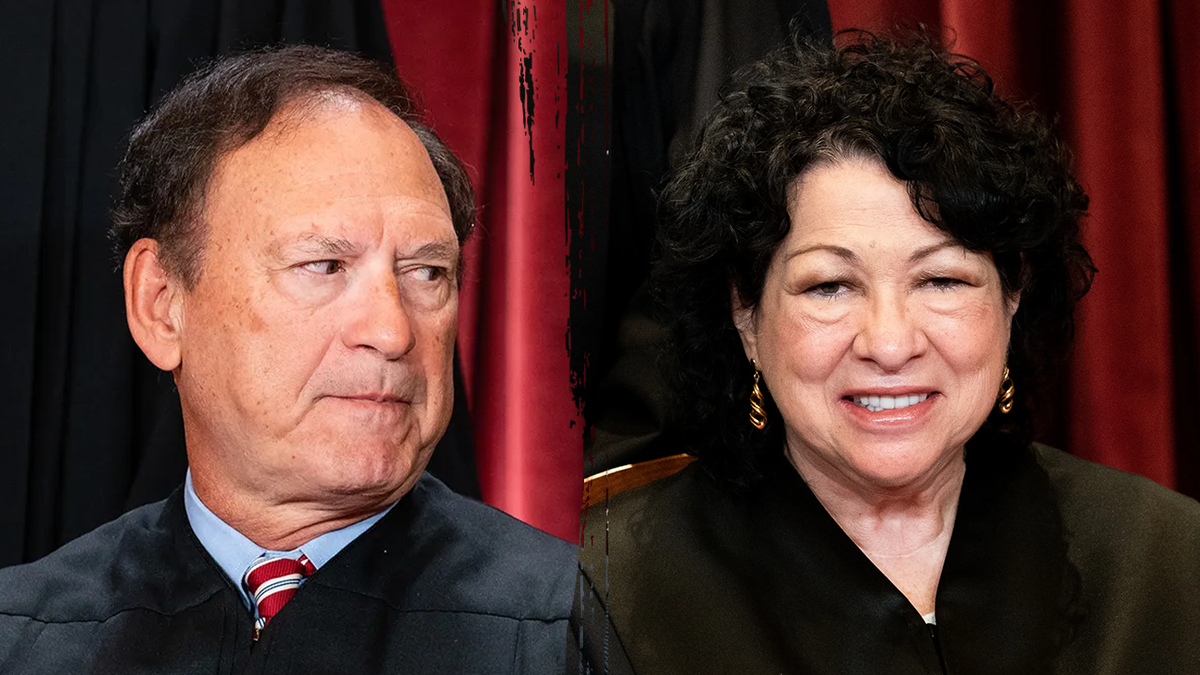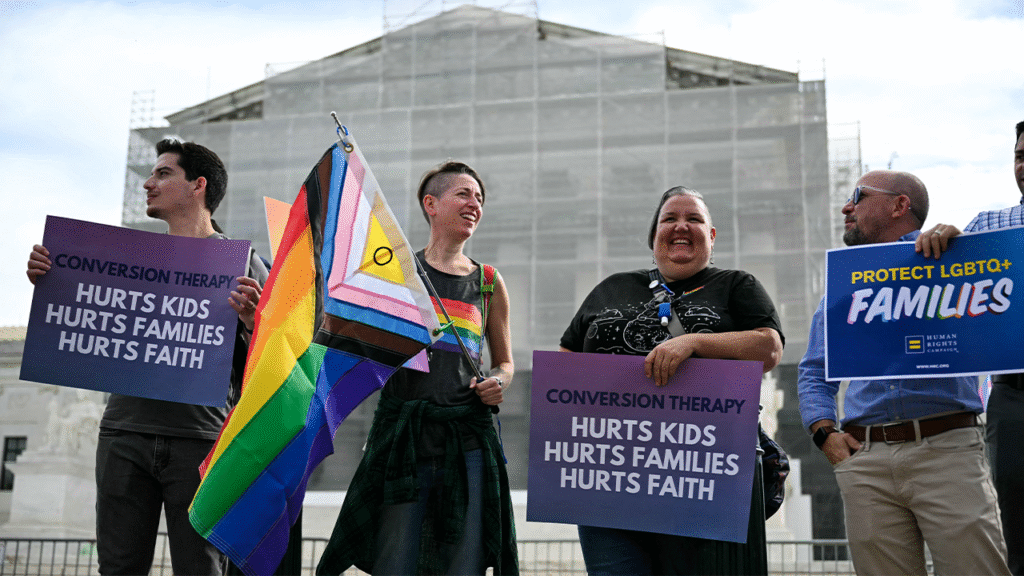NEWYou can now listen to Fox News articles!
The Supreme Court on Tuesday appeared ready to strike down Colorado’s ban on mental health professionals providing so-called “conversion therapy” to minors with gender identity or sexual orientation issues, an important First Amendment case laced with sharp political and social undertones.
Licensed counselor Kaley Chiles says the legislation violates her free speech rights and infringes on her free exercise of religion and that of her clients by censoring and prohibiting certain private client-counselor conversations.
About two dozen states and Washington, DC have laws similar to Colorado’s.
The state says it acted to regulate professional conduct, “based on overwhelming evidence that efforts to change a child’s sexual orientation or gender identity are unsafe and ineffective.”
SUPREME COURT HEARS IF FAITH-BASED COUNSELING ON GENDER IDENTITY IS PROTECTED SPEECH
During a brisk 90 minutes of oral arguments, the court’s 6-3 conservative majority appeared supportive of Chiles’ claims.
Several conservative members of the bench suggested the Colorado law created a double standard that Justice Samuel Alito said may amount to “viewpoint discrimination.”
“Let’s say that you have some medical experts that think gender-affirming care should be — is dangerous to children and some that say that this kind of conversion talk therapy is dangerous,” said Justice Amy Coney Barrett. “Can a state pick a side?”
But other justices appeared to agree with the state, which cited what it claims is the consensus of mental health professionals that verbal-based conversion therapy has shown to be ineffective.
“There are studies that say that this advice does harm the people emotionally and physically,” said Justice Sonia Sotomayor.

Justice Brett Kavanaugh and Chief Justice John Roberts could be the key to deciding the case, over whether regulation of “talk therapy” can be treated the same as medical practices.
Roberts cited previous high court precedent that did not distinguish professional speech.
“Just because they’re engaged in conduct doesn’t mean that their words aren’t protected,” said Roberts.
Among the issues the nine justices confronted were whether the state law properly distinguishes speech versus conduct, and the professional speech limits of licensed mental health therapists.
Chiles’ lawyers describe her as “a practicing Christian [who] believes that people flourish when they live consistently with God’s design, including their biological sex.”
FORMER ATTORNEY GENERAL ERIC HOLDER CALLS ON DEMOCRATS TO FOCUS ON SUPREME COURT EXPANSION, TERM LIMITS
She said she uses “faith-informed” counseling to engage in talk therapy with young people who are “seeking to reduce or eliminate unwanted sexual attractions, change sexual behaviors, or grow in the experience of harmony with one’s physical body.”
But Chiles’s lawyers say she does not “seek to ‘cure’ clients of same-sex attractions or to ‘change’ clients’ sexual orientation.”
A small group of demonstrators gathered outside the court to support the Colorado law. The group representing Chiles canceled its rally over safety concerns.
Both Chiles’ lawyer and the Colorado solicitor general offered sharply different views in the courtroom on whether previous studies on conversion therapy showed its ineffectiveness.
Colorado says there is a “mountain of evidence” that it is, and that major medical associations have found it leads to depression, anxiety and suicidal thoughts.
But Chiles argues there are no studies indicating conversion therapy is harmful, and that other studies are fundamentally flawed.
“States should not manipulate private conversations between licensed professionals and clients,” James Campbell, Chiles’ attorney, told the bench.
A majority on the court appeared to agree.
Justice Elena Kagan posed a hypothetical where two different doctors treat someone who believes they are gay — one who tells the patient to change, the other to accept it.
“And one of those is permissible, and the other is not?” Kagan asked. “That seems like viewpoint discrimination in the way we would normally understand viewpoint discrimination.”
When Colorado Solicitor General Shannon Stevenson said the core issue was about preserving the best medical practice over what therapists can tell patients, rather than freedom of speech, Alito stepped in.
“There have been times when the medical consensus has been politicized, has been taken over by ideology,” said Alito. “Once, was there a time when many medical professionals thought that certain people should not be permitted to procreate because they had low IQ?” he asked.
The Trump administration’s Justice Department told the court the law creates a “muzzling” double standard — forbidding her from helping people accept their assigned sex at birth, while allowing other therapists to support young people who may want to accept their homosexuality or transition to another gender.
Some on the bench questioned whether talk therapy amounted to — or should be treated differently than — medical care.
“I’m still just struggling with whether a therapist who is acting in their professional capacity to help someone achieve their goals is really expressing the kind of message or expressing a message for First Amendment purposes,” said Justice Ketanji Brown Jackson.
TRUMP’S PRESIDENCY FACES CRUCIAL TESTS AS SUPREME COURT BEGINS PIVOTAL TERM
“It’s just a little puzzling to me that she would stand in a different position than a medical professional who has exactly the same goals, exactly the same interests, and would just be prescribing medication for that rather than her talking with the client. “
Stevenson argued there has been a long history of states regulating therapists.
“The harms from conversion therapy come from when you tell a young person you can change this innate thing about yourself,” said Stevenson. “And they try, and they try, and they fail, and then they have shame, and they’re miserable. And then it ruins their relationships with their family.”
The American Psychiatric Association 55 years ago ceased classifying homosexuality as a mental illness.
Chiles attended the oral arguments and afterward told Fox News, “I view my work as an outpouring of my faith. I want what is best for my clients, and often they seek me out because we have a shared faith.”
“Struggling kids benefit from access to voluntary counseling, conversations that help them as they seek wholeness and gaining peace with their bodies,” added Chiles. “They deserve better than Colorado’s one-size-fits-all approach.”
The Court in recent years has confronted a range of LGBTQ+-related appeals.
In June, the conservative majority upheld a Tennessee law that bans certain medical treatment for transgender teens.
A separate ruling allowed parents to exempt their children from school story time with LGBTQ-themed books that were at odds with their religious convictions.
The court later this term will consider state laws that prohibit transgender athletes from participating in girls’ and women’s sports teams.
The Colorado case has become a political and social touchstone. 187 House and Senate Democrats, along with major medical and mental health officials are supporting the challenged law.
Groups backing Chiles include the Trump Justice Department, Association of Certified Biblical Counselors and the Family Research Council.
The debate has sparked political divisions at the national level.
A 2015 report by the Obama Health and Human Services Department concluded conversion therapy for young people should be stopped.
“There is limited research on conversion therapy efforts among children and adolescents,” said the federal Substance Abuse and Mental Health Services Administration (SAMHSA) said in its report. “However, none of the existing research supports the premise that mental or behavioral health interventions can alter gender identity or sexual orientation.”
The DHS website now has a disclaimer saying the ten-year-old report is publicly available by court order, but adds, “Any information on this page promoting gender ideology is extremely inaccurate and disconnected from truth… This page does not reflect reality and, therefore, the Administration and this Department reject it.”
The current court case is Chiles v. Salazar (24-539). A ruling is expected by early summer 2026.
Read the full article here

